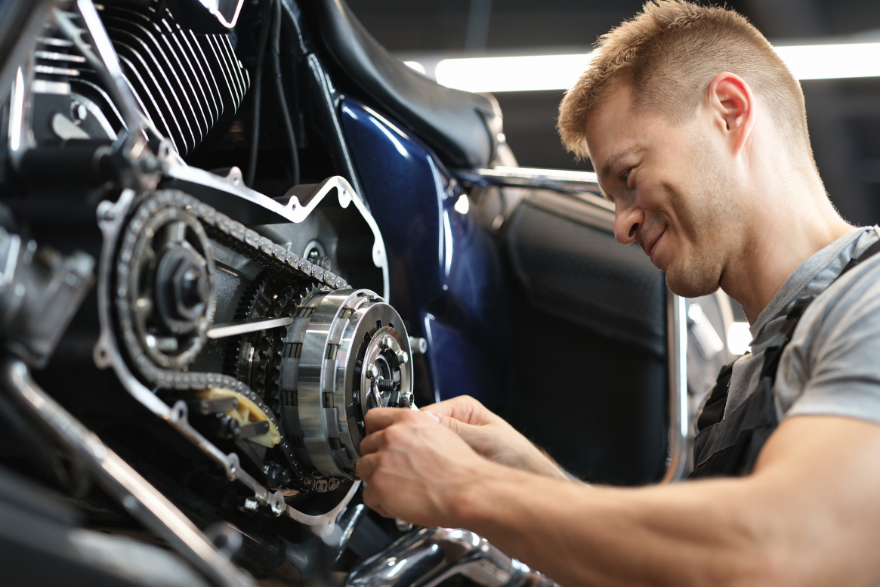Owning a motorbike is not just about the thrill of the ride; it’s about embracing a lifestyle that combines freedom with responsibility. Ensuring your motorbike is well-maintained and adhering to safety practices is paramount for both your enjoyment and security on the road. In this guide, we’ll explore essential maintenance tips and crucial safety measures every motorbike owner should follow, including the latest high-tech safety innovations.
Introduction to Motorbike Maintenance
Regular maintenance is the backbone of a reliable motorbike. By staying on top of routine checks and servicing, you can extend the life of your bike and avoid unexpected breakdowns. Here’s a detailed breakdown of the key maintenance tasks:
1. Regular Oil Changes
Oil is the lifeblood of your motorbike. Changing the oil every 3,000 to 5,000 miles ensures your engine runs smoothly. Use high-quality oil recommended by your manufacturer for optimal performance. New synthetic oils provide better protection and longer intervals between changes.
2. Check and Replace Air Filters
A clean air filter improves fuel efficiency and engine performance. Inspect the air filter every 6,000 miles and replace it if it appears dirty or clogged. Modern washable filters offer a longer lifespan and better filtration.
3. Inspect Tires
Tire maintenance is critical for safety and performance. Check tire pressure regularly, and look for signs of wear or damage. Replace tires when tread depth is below the recommended level. Using tire pressure monitoring systems (TPMS) can help you keep track of tire health more accurately.
4. Brake System
Brakes are your primary safety feature. Regularly inspect brake pads, discs, and fluid levels. Replace worn brake pads and ensure the brake system is responsive. Advanced braking systems like ABS (Anti-lock Braking System) are becoming standard on many models, offering improved safety.
5. Chain and Sprockets
A well-lubricated and correctly tensioned chain ensures smooth power delivery. Clean and lubricate the chain every 500 miles and adjust the tension as needed. Inspect sprockets for wear and replace them if necessary. Modern chains with O-ring or X-ring technology offer better longevity and performance.
High-Tech Safety Tips for Motorbike Riders
Safety should never be an afterthought. Implementing the following high-tech safety tips can significantly reduce the risk of accidents and enhance your riding experience:
1. Wear Smart Helmets
Smart helmets come equipped with integrated features such as GPS navigation, rearview cameras, and Bluetooth connectivity. These helmets can provide real-time traffic updates, navigation assistance, and even emergency alerts in case of an accident.
2. Use Advanced Rider Assistance Systems (ARAS)
Modern motorbikes are increasingly being equipped with ARAS, which includes features like adaptive cruise control, lane-keeping assistance, and blind-spot detection. These systems use sensors and cameras to monitor the road and assist the rider in making safer decisions.
3. Leverage Motorcycle-to-Vehicle (M2V) Communication
M2V communication technology allows motorbikes to communicate with other vehicles on the road, reducing the risk of collisions. This technology can alert riders to potential hazards, such as cars in their blind spots or sudden braking ahead.
4. Install Anti-Theft Devices
High-tech anti-theft devices, such as GPS trackers and smart alarms, can help protect your motorbike from theft. These devices can notify you if someone tampers with your bike and provide real-time tracking if it is stolen.
5. Wear Gear with Built-In Airbags
Modern riding gear now includes jackets and vests with built-in airbag systems. These airbags deploy in the event of a crash, providing additional protection for the rider’s upper body and reducing the risk of severe injuries.
6. Utilise Tire Pressure Monitoring Systems (TPMS)
TPMS provide real-time updates on your tire pressure, ensuring they are always at optimal levels. Proper tire pressure improves handling, fuel efficiency, and overall safety. Many TPMS can send alerts to your smartphone if there is a significant change in pressure.
7. Use Helmet Communication Systems
Helmet communication systems allow riders to stay connected with their peers, receive navigation instructions, and listen to music without taking their hands off the handlebars. These systems can also provide voice-activated controls, enhancing convenience and safety.
Conclusion
Maintaining your motorbike and prioritising safety is crucial for a fulfilling and secure riding experience. Regular maintenance not only enhances your bike’s performance but also ensures your safety on the road. By following these tips and adopting a proactive approach to safety, you can enjoy the freedom of the open road with peace of mind.
Embrace the latest high-tech safety innovations to protect yourself and enhance your riding experience. Remember, a well-maintained bike and a cautious rider make for the best journeys. Ride safe, ride smart!



 " alt="Maintaining Patient Confidentiality: A Nursing Assistant’s Duty" />
" alt="Maintaining Patient Confidentiality: A Nursing Assistant’s Duty" />
 " alt="The Importance of Proper Body Mechanics for Nursing Assistants" />
" alt="The Importance of Proper Body Mechanics for Nursing Assistants" />
 " alt="Top 10 Essential Skills for Nursing Assistant Success" />
" alt="Top 10 Essential Skills for Nursing Assistant Success" />

